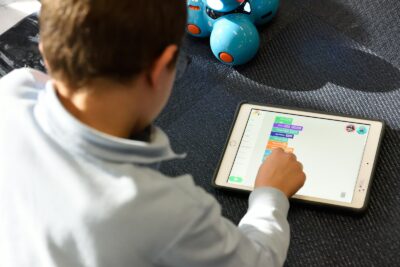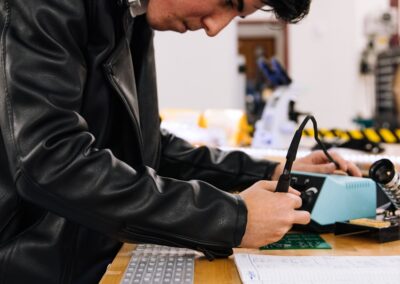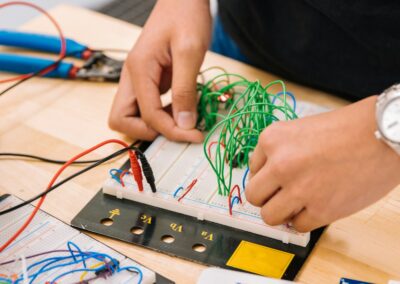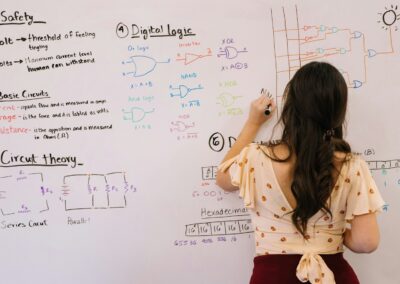Inclusive Education through Modern Technology
The Importance of Accessibility in Virtual Learning
Accessible virtual learning environments are essential for providing equitable education opportunities for all students, including those with disabilities. As modern technology continues to transform education, it is imperative that educators and institutions prioritize inclusivity to ensure that no student is left behind. This focus on accessibility is particularly relevant in regions like Saudi Arabia and the UAE, where technological advancements in education are rapidly progressing.
Virtual learning environments (VLEs) offer numerous benefits, such as flexibility, personalized learning, and the ability to reach a broader audience. However, these benefits can only be fully realized if the platforms are designed to be inclusive. This includes ensuring that content is accessible to students with visual, auditory, physical, and cognitive disabilities. Implementing accessibility features such as screen readers, captioning, and keyboard navigation can significantly enhance the learning experience for these students.
Educators play a crucial role in advocating for and implementing these accessibility features. By staying informed about the latest advancements in educational technology and accessibility standards, they can ensure that their virtual classrooms are welcoming and effective for all students. This commitment to inclusivity not only benefits students with disabilities but also enhances the overall quality of education by promoting diversity and inclusion.
Leveraging Artificial Intelligence for Accessible Education
Artificial Intelligence (AI) has the potential to revolutionize the accessibility of virtual learning environments. AI-driven tools and applications can provide personalized learning experiences tailored to the needs of each student, including those with disabilities. For instance, AI can offer real-time transcription services, converting spoken lectures into text for students with hearing impairments, or provide text-to-speech services for those with visual impairments.
Moreover, AI can help identify and address accessibility barriers within educational content. By analyzing user interactions and feedback, AI algorithms can detect patterns that indicate difficulties faced by students with disabilities. This information can then be used to make necessary adjustments, such as simplifying complex language, providing alternative formats, or offering additional support resources. In regions like Riyadh and Dubai, where educational institutions are increasingly adopting AI technologies, integrating these tools to enhance accessibility can significantly improve the learning outcomes for all students.
Additionally, AI can assist educators in developing inclusive lesson plans and materials. By leveraging AI-powered content creation tools, educators can ensure that their materials are accessible from the outset, reducing the need for subsequent modifications. This proactive approach to accessibility not only saves time and resources but also demonstrates a commitment to providing an inclusive education environment.
The Role of Blockchain in Secure and Accessible Education
Blockchain technology offers innovative solutions for enhancing the accessibility and security of virtual learning environments. By leveraging blockchain, educational institutions can create secure, decentralized platforms that ensure the privacy and integrity of student data. This is particularly important for students with disabilities, who may require sensitive information to be stored and accessed securely.
Blockchain can also facilitate the creation of digital credentials and certificates, which can be easily verified and accessed by students, educators, and employers. For students with disabilities, this means that their achievements and qualifications can be recognized and validated without the need for physical documentation, reducing barriers to accessing further education and employment opportunities. In the context of the UAE and Saudi Arabia, where blockchain technology is being explored for various applications, its integration into education can significantly enhance the inclusivity and efficiency of virtual learning environments.
Furthermore, blockchain can support the development of personalized learning pathways by securely storing and sharing students’ educational records. This allows educators to access detailed information about a student’s learning history and needs, enabling them to tailor their teaching methods and materials accordingly. By providing a transparent and immutable record of a student’s progress, blockchain can help ensure that all students, including those with disabilities, receive the support and resources they need to succeed.
Leadership and Management in Promoting Accessible Education
Fostering an Inclusive Culture in Educational Institutions
Effective leadership is crucial for promoting accessible education within virtual learning environments. School administrators and educational leaders must prioritize inclusivity and actively work to create a culture that values and supports students with disabilities. This involves setting clear policies and expectations, providing professional development opportunities for educators, and allocating resources to support accessibility initiatives.
In Saudi Arabia and the UAE, where educational reforms are underway, leaders can leverage these changes to promote inclusive education. By incorporating accessibility standards into the design and implementation of virtual learning environments, they can ensure that all students have the opportunity to succeed. This commitment to inclusivity not only benefits students with disabilities but also enhances the overall quality of education by fostering a diverse and inclusive learning community.
Additionally, educational leaders must advocate for the integration of advanced technologies, such as AI and blockchain, to enhance accessibility. By staying informed about the latest developments in educational technology, they can identify and implement solutions that meet the needs of all students. This proactive approach to leadership can drive significant improvements in the accessibility and effectiveness of virtual learning environments.
Strategic Project Management for Accessible Virtual Learning
Strategic project management is essential for the successful implementation of accessible virtual learning environments. Project managers must oversee the entire process, from initial planning and development to deployment and evaluation. This involves coordinating resources, managing timelines, and ensuring that all project activities align with the institution’s goals and accessibility standards.
Project managers in education must have a deep understanding of both technology and accessibility. They are responsible for ensuring that virtual learning platforms are designed and implemented with accessibility in mind. This includes conducting thorough accessibility testing, gathering feedback from students with disabilities, and making necessary adjustments to improve the user experience. In the dynamic educational landscapes of Riyadh and Dubai, where innovation is key, skilled project management is vital for creating inclusive virtual learning environments.
Furthermore, project managers must engage with stakeholders, including students, educators, and technology providers, to gather insights and feedback. This collaborative approach ensures that the solutions developed are effective and meet the diverse needs of the student population. By fostering strong partnerships and communication, project managers can drive the successful implementation of accessible virtual learning environments.
Conclusion
Ensuring that virtual learning environments are accessible to all students, including those with disabilities, is crucial for providing equitable education opportunities. By leveraging modern technologies such as AI and blockchain, educators and institutions can create inclusive and effective virtual learning platforms. Effective leadership and strategic project management are essential for promoting accessibility and fostering an inclusive culture within educational institutions. In regions like Saudi Arabia and the UAE, where technological innovation is a priority, integrating accessibility into virtual learning environments can significantly enhance the quality of education and support the success of all students.
#AccessibleLearning #VirtualLearning #InclusiveEducation #AIinEducation #Blockchain #ModernTechnology #BusinessSuccess #LeadershipSkills #ProjectManagement #SaudiArabia #UAE #Riyadh #Dubai


























